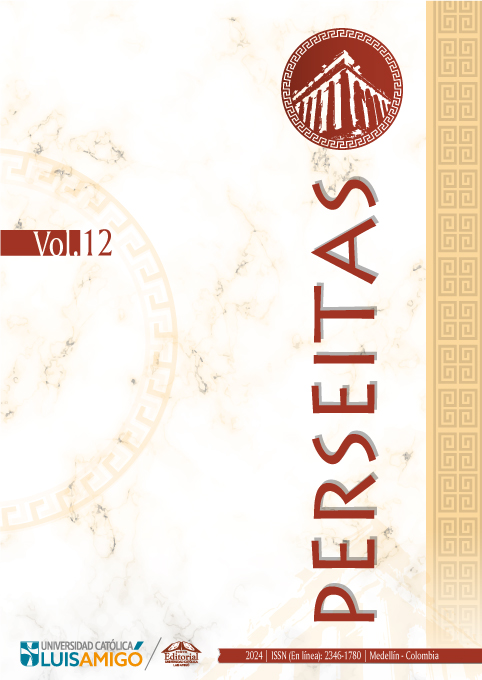The longing for God and the trust in his help: Ps 63(62) in the light of Semitic Biblical Rhetoric Analysis
DOI:
https://doi.org/10.21501/23461780.4765Keywords:
Biblical Semitic, Book of Psalms, Curse in the Psalms, Psalm 63, Rhetoric Analysis Desire for God, Temple, Worship in the Old TestamentAbstract
Ps 63(62) is of singular importance for the Christian liturgy. Evoking the desire for God that makes human beings rise before dawn to seek Him (v.2), this Psalm has become the morning prayer par excellence, both for the Byzantine liturgy, which recites it in the órthros, as for the Roman liturgy which, after the liturgical reform of Vatican II, reserved it for Laudes on Sunday of the First Week of the Psalter. The purpose of this article is to analyze Ps 63(62) through the method of Semitic Biblical Rhetoric Analysis, with the aim of establishing its structure and thus realizing its most relevant theological elements. To fulfill this purpose, the article is divided into three parts: i) translation of the text; ii) criticism of the form and iii) establishment of the structure according to the method. Finally it ends with the theological commentary. The article leads the reader to the perception that the Psalm has a tripartite structure. The first two arts are articulated in the daytime (vv.2-6) and nighttime (vv.7-9) scope, where the psalmist expresses his desire for God, recalls his past experience and expresses his trust in the Lord. The last part of the Psalm is the imprecation, which evokes a mysterious “they” (v.10a), thus connecting with the “thou” evoked at the beginning of the sentence (v.2a). To the amorphous “they” of the enemy corresponds the manifest divine “thou”, in whom the psalmist trusts and whose “love” he recognizes as being better than existence itself (v.4a).
Downloads
References
Agostinho (1997). Comentário aos Salmos (Enarrationes in Psalmos) Salmos 51-100. Paulus. (Obra publicada originalmente ca. 422).
Alonso Schökel, L. (1997). Dicionário Bíblico Hebraico-Português. Paulus.
Alonso Schökel, L.; Carniti, C. (1996). Salmos I (Salmos 1-72). Paulus.
Aparicio, A. (2006). Salmos 42-72. Comentario a la nueva Biblia de Jerusalén Desclée de Brouwer.
Clifford, J. R. (2021). Revisiting Psalm 63. Biblischen Notizen, 191, 89-97. https://media.herder.de/files/nb-nf-191-2021-web-id-10179.pdf
Corbajosa, I. (2018). Salmos I (Salmos 1-72). BAC.
Del Barco Del Barco, F. J. (2003). Profecía y Sintaxis: el uso de las formas verbales en los Profetas Menores preexílicos. Consejo Superior de Investigaciones Científicas.
Elliger, K.; Rudolph, W. (Eds.) (1997). Biblia Hebraica Stuttgartensia. Deutsche Bibelgesellschaft.
Flecha Andrés, J.-R. (2021). Para orar con los Salmos. BAC.
García Lopez, F. שָׁמַר. (2006). En H. Ringgren, H.-J. Fabry y G. J. Botterweck (Eds.). Theological Dictionary of the Old Testament. (Vol. 15, pp 279-305). Eerdmans Publishing Co.
Gerstenberger, E. S. (2001). Psalms, Part 2, and Lamentations. Eerdmans Publishing Company.
Gonzaga, W. (2018). O Salmo 150 à luz da Análise Retórica Semítica. ReBiblica, v.1, n. 2, 155-170. Acesso pelo link: https://revistaseletronicas.pucrs.br/ojs/index.php/ReBiblica/article/view/32984
Gonzaga, W.; Telles, A. C. (2022). A oração imprecatória do Salmo 35 à luz da Análise Retórica Bíblica Semítica e seu uso no Novo Testamento. In: Gonzaga, W. et allii. Salmos na Perspectiva da Análise Retórica Bíblica Semítica. EdiPUC-Rio e Letra Capital.
Harman, A. (2011). Salmos. Cultura Cristã.
Janowski, B. (2021). A Temple in Words: The Theological Architecture of the Psalter. En G. BARBIERO, M. PAVAN y J. SCHNOCKS. The Formation of the Hebrew Psalter. (pp 89-97). Mohr Siebeck.
Koehler L.; Baumgartner, W. (2001). The Hebrew and Aramaic Lexicon of the Old Testament. Brill.
Kraus, H.-J. (1993). Los Salmos: Sal 60-150. Sígueme.
Lipinski, E; Fabry, H.-J. עָזַר. (2001). En H. Ringgren, H.-J. Fabry y G. J. Botterweck (Eds.). Theological Dictionary of the Old Testament. (Vol. 11, pp 12-18). Eerdmans Publishing Co.
Mays, J. L. (2010). Salmi. Claudiana.
Meynet, R. (2018). Le Psautier: Deuxième livre (Ps 42/43 – 72). Peeters.
Meynet, R. (1992). L’Analise Retorica. Queriniana.
Meynet, R. (1993). A análise retórica. Um novo método para compreender a Bíblia. Brotéria 137, 391-408.
Meynet, R. (1996). I frutti dell’analisi retorica per l’esegesi biblica. Gregorianum, v.77, n.3, 403-436.
Meynet, R. (2008). Trattato di Retorica Biblica. EDB.
Meynet, R. (2020). La retorica biblica. Atualidade Teológica, Rio de Janeiro, v.24, n. 65, 431-468. Doi: https://doi.org/10.17771/PUCRio.ATeo.49825.
Monti, L. (2018). I Salmi: preghiera e vita. QiQajon.
Negoită, A.; Ringgren, H. (1978). הָגָה. En H. Ringgren, H.-J. Fabry y G. J. Botterweck (Eds.). Theological Dictionary of the Old Testament. (Vol. 3, pp 321-324). Eerdmans Publishing Co.
Niccacci, A. (2002). Sintaxis del Hebreo Bíblico. Editorial Verbo Divino.
Oden, T. C.; Edwards, M. J. (eds.) (2017). Salmos 51-150. La Biblia Comentada por los Padres de la Iglesia. Antiguo Testamento, 9. Ciudad Nueva.
Pikaza, X. (2023). Enséñanos a orar. El libro de los Salmos. Verbo Divino.
Prieto Silva, S. (2016). “A la aurora te busco” (Sl 63,2): Estudio exegético-teológico de Salmo 63. Gregorian & Biblical Press.
Rahlfs, A.; Hanhart, R. (eds.). (2006). Septuaginta. Deutsche Bibelgesellschaft.
Ravasi, G. (1985). Livro dei Salmi (51-100): Commento e Attualizzazione. Dehoniane.
Ringgren, H. אֱלֹהִים. (1974). En H. Ringgren, H.-J. Fabry y G. J. Botterweck (Eds.). Theological Dictionary of the Old Testament. (Vol. 1, pp 336-339). Eerdmans Publishing Co.
Stoebe, H. J. חֶסֶד. (1978). En E. Jenni y C. Westermann (Eds.). Diccionario Teologico Manual del Antiguo Testamento. (Vol. 1, pp 832-861). Ediciones Cristiandad.
Weber, R.; Gryson, R. (eds.). (2007). Biblia Sacra Vulgata. Iuxta Vulgatam Versionem. Deutsche Bibelgesellschaft.
Weiser, A. (1984) I Salmi – Parte seconda: Ps 61 – 150. Paideia.
Westermann, C. נֶפֶשׁ. (1978). En E. Jenni y C. Westermann (Eds.). Diccionario Teologico Manual del Antiguo Testamento. (Vol. 1, pp 102-133). Ediciones Cristiandad.
Zenger, E. (1996). A God of Vengeance? Understanding the Psalms of Divine Wrath. Westminster John Knox Press.
Published
How to Cite
Issue
Section
License

This work is licensed under a Creative Commons Attribution-NonCommercial-NoDerivatives 4.0 International License.
La revista y los textos individuales que en esta se divulgan están protegidos por las leyes de copyright y por los términos y condiciones de la Licencia Creative Commons Atribución-No Comercial-Sin Derivar 4.0 Internacional.
















